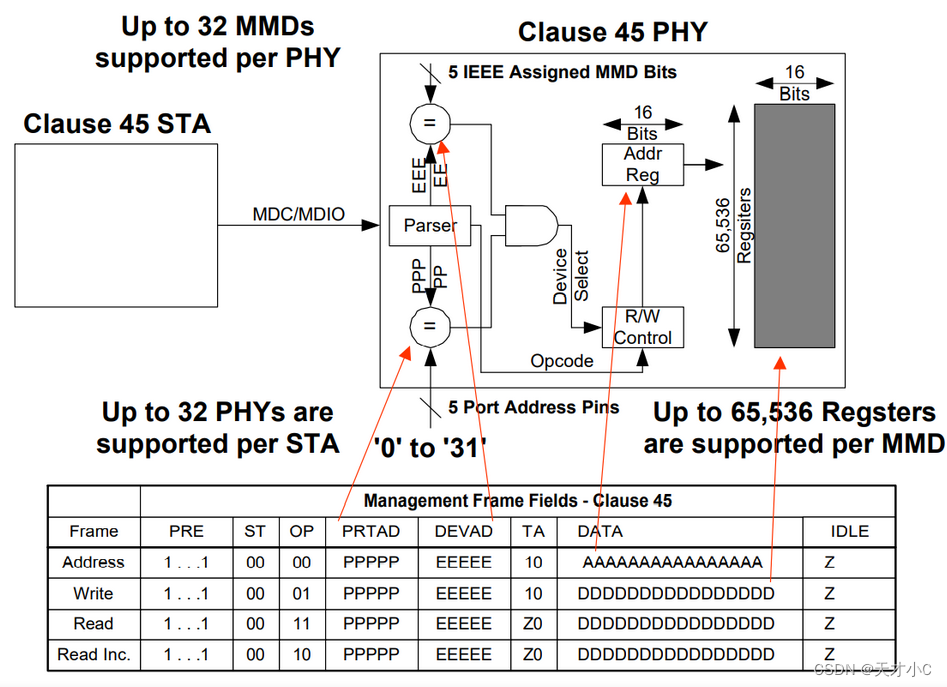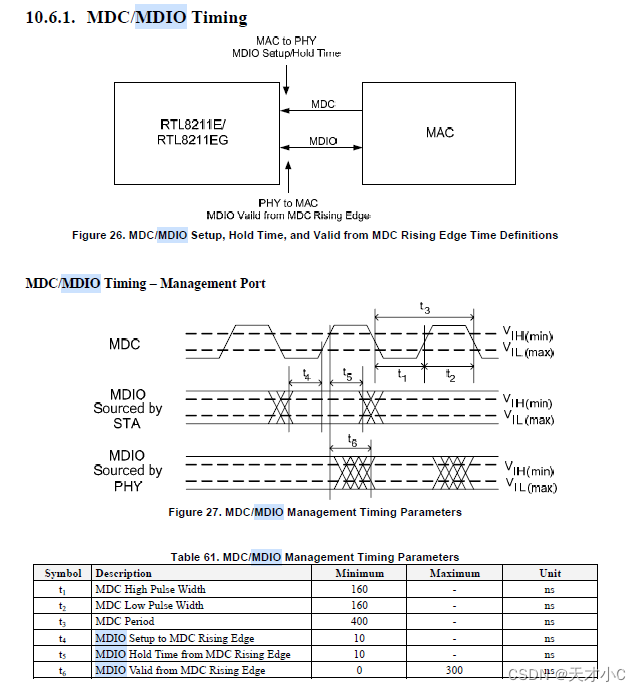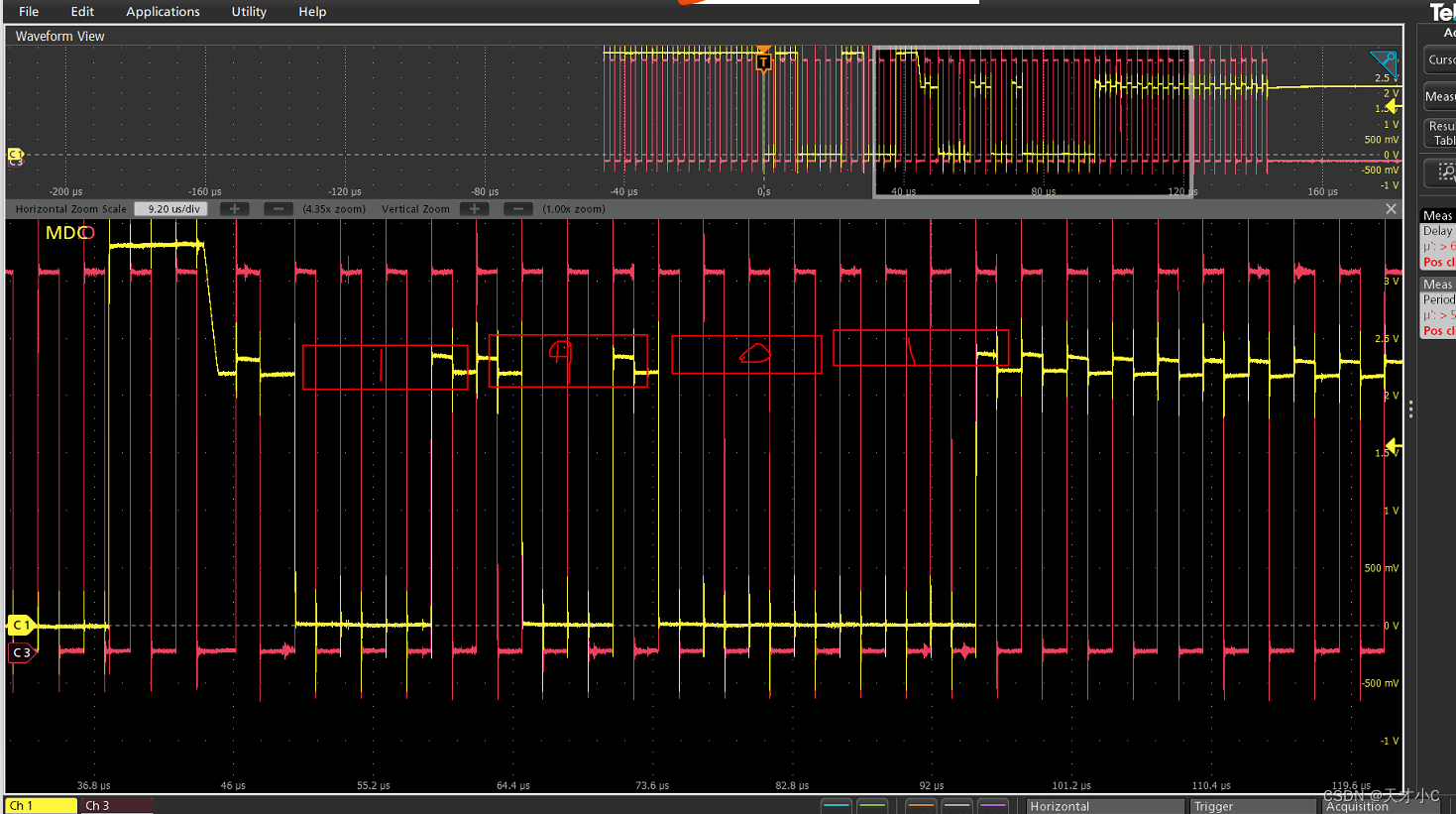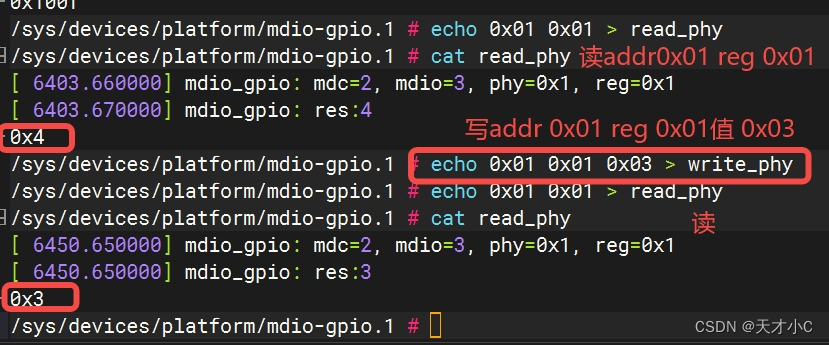背景
CPU:AST2500
驱动里实现GPIO模拟MDIO驱动,参考内核驱动mdio-bitbang.c和mdio-gpio.c,当前项目不支持设备树,驱动需要改成platform注册
MDIO介绍
SMI接口
SMI是MAC内核访问PHY寄存器接口,它由两根线组成,双工,MDC为时钟,MDIO为双向数据通信,原理上跟I2C总线很类似,也可以通过总线访问多个不同的phy。
MDC/MDIO基本特性:
- 两线制:MDC(时钟线)和MDIO(数据线)。
- 时钟频率:2.5MHz
- 通信方式:总线制,可同时接入的PHY数量为32个
- 通过SMI接口,MAC芯片主动的轮询PHY层芯片,获得状态信息,并发出命令信息。
Clause22

Clause45

内核源码
修改后的源码不方便放上来,这里放的是内核源码
mdio-gpio.c
// SPDX-License-Identifier: GPL-2.0
/** GPIO based MDIO bitbang driver.* Supports OpenFirmware.** Copyright (c) 2008 CSE Semaphore Belgium.* by Laurent Pinchart <laurentp@cse-semaphore.com>** Copyright (C) 2008, Paulius Zaleckas <paulius.zaleckas@teltonika.lt>** Based on earlier work by** Copyright (c) 2003 Intracom S.A.* by Pantelis Antoniou <panto@intracom.gr>** 2005 (c) MontaVista Software, Inc.* Vitaly Bordug <vbordug@ru.mvista.com>*/#include <linux/module.h>
#include <linux/slab.h>
#include <linux/interrupt.h>
#include <linux/platform_device.h>
#include <linux/platform_data/mdio-gpio.h>
#include <linux/mdio-bitbang.h>
#include <linux/mdio-gpio.h>
#include <linux/gpio/consumer.h>
#include <linux/of_mdio.h>struct mdio_gpio_info {struct mdiobb_ctrl ctrl;struct gpio_desc *mdc, *mdio, *mdo;
};static int mdio_gpio_get_data(struct device *dev,struct mdio_gpio_info *bitbang)
{bitbang->mdc = devm_gpiod_get_index(dev, NULL, MDIO_GPIO_MDC,GPIOD_OUT_LOW);if (IS_ERR(bitbang->mdc))return PTR_ERR(bitbang->mdc);bitbang->mdio = devm_gpiod_get_index(dev, NULL, MDIO_GPIO_MDIO,GPIOD_IN);if (IS_ERR(bitbang->mdio))return PTR_ERR(bitbang->mdio);bitbang->mdo = devm_gpiod_get_index_optional(dev, NULL, MDIO_GPIO_MDO,GPIOD_OUT_LOW);return PTR_ERR_OR_ZERO(bitbang->mdo);
}static void mdio_dir(struct mdiobb_ctrl *ctrl, int dir)
{struct mdio_gpio_info *bitbang =container_of(ctrl, struct mdio_gpio_info, ctrl);if (bitbang->mdo) {/* Separate output pin. Always set its value to high* when changing direction. If direction is input,* assume the pin serves as pull-up. If direction is* output, the default value is high.*/gpiod_set_value_cansleep(bitbang->mdo, 1);return;}if (dir)gpiod_direction_output(bitbang->mdio, 1);elsegpiod_direction_input(bitbang->mdio);
}static int mdio_get(struct mdiobb_ctrl *ctrl)
{struct mdio_gpio_info *bitbang =container_of(ctrl, struct mdio_gpio_info, ctrl);return gpiod_get_value_cansleep(bitbang->mdio);
}static void mdio_set(struct mdiobb_ctrl *ctrl, int what)
{struct mdio_gpio_info *bitbang =container_of(ctrl, struct mdio_gpio_info, ctrl);if (bitbang->mdo)gpiod_set_value_cansleep(bitbang->mdo, what);elsegpiod_set_value_cansleep(bitbang->mdio, what);
}static void mdc_set(struct mdiobb_ctrl *ctrl, int what)
{struct mdio_gpio_info *bitbang =container_of(ctrl, struct mdio_gpio_info, ctrl);gpiod_set_value_cansleep(bitbang->mdc, what);
}static const struct mdiobb_ops mdio_gpio_ops = {.owner = THIS_MODULE,.set_mdc = mdc_set,.set_mdio_dir = mdio_dir,.set_mdio_data = mdio_set,.get_mdio_data = mdio_get,
};static struct mii_bus *mdio_gpio_bus_init(struct device *dev,struct mdio_gpio_info *bitbang,int bus_id)
{struct mdio_gpio_platform_data *pdata = dev_get_platdata(dev);struct mii_bus *new_bus;bitbang->ctrl.ops = &mdio_gpio_ops;new_bus = alloc_mdio_bitbang(&bitbang->ctrl);if (!new_bus)return NULL;new_bus->name = "GPIO Bitbanged MDIO";new_bus->parent = dev;if (bus_id != -1)snprintf(new_bus->id, MII_BUS_ID_SIZE, "gpio-%x", bus_id);elsestrncpy(new_bus->id, "gpio", MII_BUS_ID_SIZE);if (pdata) {new_bus->phy_mask = pdata->phy_mask;new_bus->phy_ignore_ta_mask = pdata->phy_ignore_ta_mask;}dev_set_drvdata(dev, new_bus);return new_bus;
}static void mdio_gpio_bus_deinit(struct device *dev)
{struct mii_bus *bus = dev_get_drvdata(dev);free_mdio_bitbang(bus);
}static void mdio_gpio_bus_destroy(struct device *dev)
{struct mii_bus *bus = dev_get_drvdata(dev);mdiobus_unregister(bus);mdio_gpio_bus_deinit(dev);
}static int mdio_gpio_probe(struct platform_device *pdev)
{struct mdio_gpio_info *bitbang;struct mii_bus *new_bus;int ret, bus_id;bitbang = devm_kzalloc(&pdev->dev, sizeof(*bitbang), GFP_KERNEL);if (!bitbang)return -ENOMEM;ret = mdio_gpio_get_data(&pdev->dev, bitbang);if (ret)return ret;if (pdev->dev.of_node) {bus_id = of_alias_get_id(pdev->dev.of_node, "mdio-gpio");if (bus_id < 0) {dev_warn(&pdev->dev, "failed to get alias id\n");bus_id = 0;}} else {bus_id = pdev->id;}new_bus = mdio_gpio_bus_init(&pdev->dev, bitbang, bus_id);if (!new_bus)return -ENODEV;ret = of_mdiobus_register(new_bus, pdev->dev.of_node);if (ret)mdio_gpio_bus_deinit(&pdev->dev);return ret;
}static int mdio_gpio_remove(struct platform_device *pdev)
{mdio_gpio_bus_destroy(&pdev->dev);return 0;
}static const struct of_device_id mdio_gpio_of_match[] = {{ .compatible = "virtual,mdio-gpio", },{ /* sentinel */ }
};
MODULE_DEVICE_TABLE(of, mdio_gpio_of_match);static struct platform_driver mdio_gpio_driver = {.probe = mdio_gpio_probe,.remove = mdio_gpio_remove,.driver = {.name = "mdio-gpio",.of_match_table = mdio_gpio_of_match,},
};module_platform_driver(mdio_gpio_driver);MODULE_ALIAS("platform:mdio-gpio");
MODULE_AUTHOR("Laurent Pinchart, Paulius Zaleckas");
MODULE_LICENSE("GPL v2");
MODULE_DESCRIPTION("Generic driver for MDIO bus emulation using GPIO");
mdio-bitbang.c
// SPDX-License-Identifier: GPL-2.0
/** Bitbanged MDIO support.** Author: Scott Wood <scottwood@freescale.com>* Copyright (c) 2007 Freescale Semiconductor** Based on CPM2 MDIO code which is:** Copyright (c) 2003 Intracom S.A.* by Pantelis Antoniou <panto@intracom.gr>** 2005 (c) MontaVista Software, Inc.* Vitaly Bordug <vbordug@ru.mvista.com>*/#include <linux/module.h>
#include <linux/mdio-bitbang.h>
#include <linux/types.h>
#include <linux/delay.h>#define MDIO_READ 2
#define MDIO_WRITE 1#define MDIO_C45 (1<<15)
#define MDIO_C45_ADDR (MDIO_C45 | 0)
#define MDIO_C45_READ (MDIO_C45 | 3)
#define MDIO_C45_WRITE (MDIO_C45 | 1)#define MDIO_SETUP_TIME 10
#define MDIO_HOLD_TIME 10/* Minimum MDC period is 400 ns, plus some margin for error. MDIO_DELAY* is done twice per period.*/
#define MDIO_DELAY 250/* The PHY may take up to 300 ns to produce data, plus some margin* for error.*/
#define MDIO_READ_DELAY 350/* MDIO must already be configured as output. */
static void mdiobb_send_bit(struct mdiobb_ctrl *ctrl, int val)
{const struct mdiobb_ops *ops = ctrl->ops;ops->set_mdio_data(ctrl, val);ndelay(MDIO_DELAY);ops->set_mdc(ctrl, 1);ndelay(MDIO_DELAY);ops->set_mdc(ctrl, 0);
}/* MDIO must already be configured as input. */
static int mdiobb_get_bit(struct mdiobb_ctrl *ctrl)
{const struct mdiobb_ops *ops = ctrl->ops;ndelay(MDIO_DELAY);ops->set_mdc(ctrl, 1);ndelay(MDIO_READ_DELAY);ops->set_mdc(ctrl, 0);return ops->get_mdio_data(ctrl);
}/* MDIO must already be configured as output. */
static void mdiobb_send_num(struct mdiobb_ctrl *ctrl, u16 val, int bits)
{int i;for (i = bits - 1; i >= 0; i--)mdiobb_send_bit(ctrl, (val >> i) & 1);
}/* MDIO must already be configured as input. */
static u16 mdiobb_get_num(struct mdiobb_ctrl *ctrl, int bits)
{int i;u16 ret = 0;for (i = bits - 1; i >= 0; i--) {ret <<= 1;ret |= mdiobb_get_bit(ctrl);}return ret;
}/* Utility to send the preamble, address, and* register (common to read and write).*/
static void mdiobb_cmd(struct mdiobb_ctrl *ctrl, int op, u8 phy, u8 reg)
{const struct mdiobb_ops *ops = ctrl->ops;int i;ops->set_mdio_dir(ctrl, 1);/** Send a 32 bit preamble ('1's) with an extra '1' bit for good* measure. The IEEE spec says this is a PHY optional* requirement. The AMD 79C874 requires one after power up and* one after a MII communications error. This means that we are* doing more preambles than we need, but it is safer and will be* much more robust.*/for (i = 0; i < 32; i++)mdiobb_send_bit(ctrl, 1);/* send the start bit (01) and the read opcode (10) or write (01).Clause 45 operation uses 00 for the start and 11, 10 forread/write */mdiobb_send_bit(ctrl, 0);if (op & MDIO_C45)mdiobb_send_bit(ctrl, 0);elsemdiobb_send_bit(ctrl, 1);mdiobb_send_bit(ctrl, (op >> 1) & 1);mdiobb_send_bit(ctrl, (op >> 0) & 1);mdiobb_send_num(ctrl, phy, 5);mdiobb_send_num(ctrl, reg, 5);
}/* In clause 45 mode all commands are prefixed by MDIO_ADDR to specify thelower 16 bits of the 21 bit address. This transfer is done identically to aMDIO_WRITE except for a different code. To enable clause 45 mode orMII_ADDR_C45 into the address. Theoretically clause 45 and normal devicescan exist on the same bus. Normal devices should ignore the MDIO_ADDRphase. */
static int mdiobb_cmd_addr(struct mdiobb_ctrl *ctrl, int phy, u32 addr)
{unsigned int dev_addr = (addr >> 16) & 0x1F;unsigned int reg = addr & 0xFFFF;mdiobb_cmd(ctrl, MDIO_C45_ADDR, phy, dev_addr);/* send the turnaround (10) */mdiobb_send_bit(ctrl, 1);mdiobb_send_bit(ctrl, 0);mdiobb_send_num(ctrl, reg, 16);ctrl->ops->set_mdio_dir(ctrl, 0);mdiobb_get_bit(ctrl);return dev_addr;
}static int mdiobb_read(struct mii_bus *bus, int phy, int reg)
{struct mdiobb_ctrl *ctrl = bus->priv;int ret, i;if (reg & MII_ADDR_C45) {reg = mdiobb_cmd_addr(ctrl, phy, reg);mdiobb_cmd(ctrl, MDIO_C45_READ, phy, reg);} elsemdiobb_cmd(ctrl, MDIO_READ, phy, reg);ctrl->ops->set_mdio_dir(ctrl, 0);/* check the turnaround bit: the PHY should be driving it to zero, if this* PHY is listed in phy_ignore_ta_mask as having broken TA, skip that*/if (mdiobb_get_bit(ctrl) != 0 &&!(bus->phy_ignore_ta_mask & (1 << phy))) {/* PHY didn't drive TA low -- flush any bits it* may be trying to send.*/for (i = 0; i < 32; i++)mdiobb_get_bit(ctrl);return 0xffff;}ret = mdiobb_get_num(ctrl, 16);mdiobb_get_bit(ctrl);return ret;
}static int mdiobb_write(struct mii_bus *bus, int phy, int reg, u16 val)
{struct mdiobb_ctrl *ctrl = bus->priv;if (reg & MII_ADDR_C45) {reg = mdiobb_cmd_addr(ctrl, phy, reg);mdiobb_cmd(ctrl, MDIO_C45_WRITE, phy, reg);} elsemdiobb_cmd(ctrl, MDIO_WRITE, phy, reg);/* send the turnaround (10) */mdiobb_send_bit(ctrl, 1);mdiobb_send_bit(ctrl, 0);mdiobb_send_num(ctrl, val, 16);ctrl->ops->set_mdio_dir(ctrl, 0);mdiobb_get_bit(ctrl);return 0;
}struct mii_bus *alloc_mdio_bitbang(struct mdiobb_ctrl *ctrl)
{struct mii_bus *bus;bus = mdiobus_alloc();if (!bus)return NULL;__module_get(ctrl->ops->owner);bus->read = mdiobb_read;bus->write = mdiobb_write;bus->priv = ctrl;return bus;
}
EXPORT_SYMBOL(alloc_mdio_bitbang);void free_mdio_bitbang(struct mii_bus *bus)
{struct mdiobb_ctrl *ctrl = bus->priv;module_put(ctrl->ops->owner);mdiobus_free(bus);
}
EXPORT_SYMBOL(free_mdio_bitbang);MODULE_LICENSE("GPL v2");
移植注意点
注意一
查看发送端和接收端的datasheet确认读写数据时是上升沿还是下降沿,AST2500是下降沿,phy端是上升沿,所以写的时候需要上升沿,读取数据时是下降沿采集

注意二
模拟MDIO的两个GPIO属于同一个寄存器,同一时间快速操作影响clk和data时序
注意三
实际读的时候从波形来看,发现phy端在TA时没有拉低,导致读取数据失败,workaround就是跳过这一时序
注意四
OS里是无法直接看到类似eth0这样的设备,所以不能用传统注册MDIO bus,直接模拟通信
用例展示
读取芯片型号和版本






成功举办)





FPGA部分)




函数)



